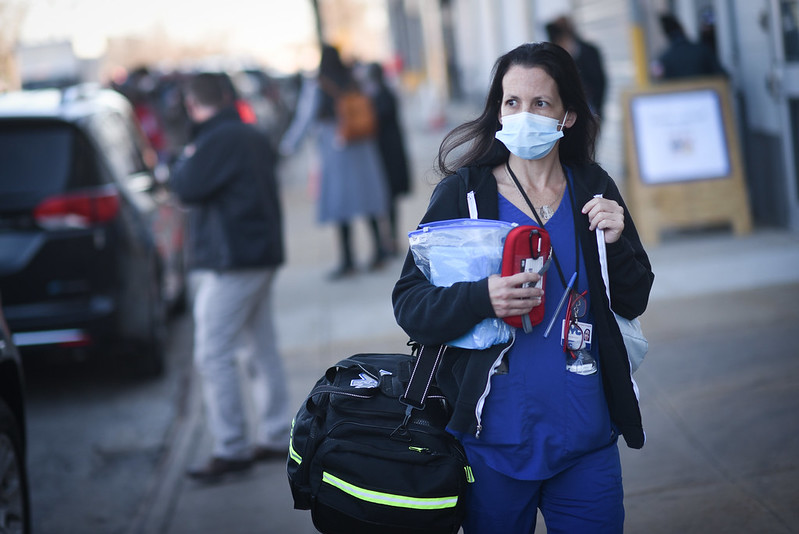
Nurses help (photo: Michael Appleton/Mayoral Photography Office)
Dear Mayor de Blasio and other city budget decision-makers,
The federal government recently provided funds for our school system to recover from the pandemic as part of the American Rescue Plan’s Elementary and Secondary School Emergency Relief (ESSER). In addition, New York State has fully funded the Foundation Aid formula for the first time since 2007. A public health crisis brought our city to a grinding halt in early 2020, and the decade-old school nurse crisis has reached a zenith of daily shortages, anger over working conditions, and pay inequity. New York City has enough money to care for the health of our students in schools. School nurses must be included in the next city budget, for fiscal year 2022, due by July 1.
The health and welfare of children in schools has not been a priority for this administration. There is a crisis in our schools due to a severe shortage of Permanent Full Time Nurses. With over 400 vacancies citywide, our children are at risk.
These are the facts that you and other decision-makers have chosen to ignore. First, it is difficult to attract nurses at a lower salary that is uncompetitive with the industry’s prevailing wage for nurses. School nurses are essential, yet the average pay for a Department of Health/Mental Health (DOHMH) Public Health School Nurse is approximately $62,000 per year. Registered Nurses in New York City are paid on average $84,000. Retention for school nurses is therefore poor: approximately 50% leave the job in 3-6 months.
Further, Department of Education (DOE) nurses are paid more (and work fewer hours) but there is a three-year wait list to get one of those coveted spots. This pay disparity between DOE and DOHMH School Nurses negatively impacts the work environment. We demand equal pay for equal work. In addition, DOHMH nurses perform the same professional job and role in the school for a lower salary and fewer benefits. DOHMH nurses are also first responders for city emergencies.
During the Pandemic, Travel Nurses were hired from around the country and paid higher rates, put up in hotels, and paid a daily meal stipend – amounting to about double the rate that our local nurses get but for doing less work. As you know, these traveling nurses are leaving New York City at the end of this school year, which is the main reason we stand to have 400 vacancies with no plan to solve the problem before the 2021-2022 school year.
In addition, School Nurses are engaged in direct and preventative care with an emphasis on family involvement. In New York City Schools, there are greater than 200,000 children with asthma, greater than 2,000 diabetic children, greater than 40,000 children with severe allergies requiring EPI pens, and countless others with both physical and emotional disabilities. Without proper care, children suffer. This spring alone, we lost a child to asthma in Harlem who should have had access to his school nurse. Multiple children died by suicide in New York City, and we nurses know that the health of our students must be prioritized as our schools fully reopen.
You have chosen to outsource nurses to save money, but contract nurses do not have access to online health records (ASHR) or develop relationships within their school communities. Taxpayers don’t even benefit from the savings, because of unintended consequences such as lawsuits, like the one involving families with diabetic children and the American Diabetes Association.
Perhaps what’s most dangerous is the fact that dozens of schools go unstaffed each school day, leading to scheduling changes. School nurses are frequently expected to leave their schools unattended and travel to other schools to administer medications and treatments. If a school nurse cannot get there, the Principal often calls 911 if a child needs care. And if no nurse can be staffed for the day, the Principal contacts the parent of a child with a medical need before school to keep the student at home for the day.
Finally, conditions in medical rooms need improvement. Many medical rooms do not have air conditioning and proper ventilation. This can have a number of negative outcomes, including compromising children with asthma when they are being treated by the nurse.
People take notice when there are emergencies and fatalities, but by then it’s too late. We need to take action now, we have the funds from the state and federal governments, and we must prioritize the health of the children in our schools. The only right choice is to hire permanent, full-time nurses for our schools.
Respectfully,
School Nurses
P.S. We will be rallying to make this call of our elected leaders on the steps of 52 Chambers Street on Wednesday, May 26, at 5 p.m. if you care to join us.
This open letter is signed by retired DOHMH Nurse Supervisor Mary Lawson, two other retired nurses and nurse supervisors, and 25 working nurses from DOE and DOHMH and all five boroughs. Most signers have preferred to remain anonymous due to their employment situations and fear of adverse career impacts from coming forward.
***
Have an op-ed idea or submission for Gotham Gazette? Email This email address is being protected from spambots. You need JavaScript enabled to view it.




